- Home
- Diane Fanning
Treason in the Secret City Page 9
Treason in the Secret City Read online
Page 9
‘How do you know that?’ I asked.
‘While Gregg was getting Frannie settled in at the hotel, I called my sister. She gave me the address.’
‘No one on the outside is supposed to know that information,’ I said.
‘No, but—’
I cut him off. ‘But Hansrote is revealing secrets to the enemy so what difference does it make?’
‘Exactly. Anyway, remember when Hansrote came here, Henrietta said she wouldn’t come down until he found a suitable home for her and their two daughters. He got one of the larger cemesto houses on Thornton Road, based on the fact that his family would be moving in. When he told Henrietta about it, she asked a lot of questions. He gave her the street address and bragged about how it was one of the best homes here.
‘Henrietta told my sister, that he described it to her, that it sounded like a hovel, a cramped little shack, and she didn’t know how he thought it was suitable. But, apparently, the final straw was when he told her to pack galoshes or boots for herself and the girls because of all the mud. According to my sister, Henrietta told him, that she was willing to forsake civilization to go to the barbaric backwoods of Tennessee for the sake of winning the war, but that she refused to subject herself and her daughters to primitive, unsanitary conditions. Apparently, it was beneath the dignity of a Rockefeller! My sister said that she didn’t think Henrietta ever had any intentions of going but just strung Hansrote along to get him out from under foot. The marriage, apparently, was not made in heaven.’
It was more gossip than hard-fact but it sure was entertaining. And people want to know why I am dubious about marriage. Hard for me to understand why they approach with such eagerness. Focusing on the issue at hand, I said, ‘Someone needs to stake out his house.’
‘I’d already planned to do that, Libby,’ Joe said. ‘It sure would make it easier to follow him to work, though, if I could use your car.’
‘Certainly, drive it back to your room tonight so you can set out early. You may want to go past his house before you go to the dorm to figure out the best place to park tomorrow morning while you wait for him. While we’re talking about the car, I am willing to make it available to all of you for work on this case. We’ll have to be careful not to run through the gas ration coupons, but as long as they seem to be holding up, I’ll drive to work every day so that if someone needs to continue our investigation, it will be readily available.’
‘I need to check on Frannie tomorrow evening. I think she’ll need a lot of contact to keep her spirits up and I need to show up there enough to make our marriage believable to the staff.’
‘If it’s all right, I’ll ride in to town with you,’ Joe said. ‘My sister is having tea with Henrietta tomorrow and I can call and find out if she knows anything more.’
‘Agreed,’ I said. ‘But go immediately after work so that we can meet up at Joe’s later and share information. I think I know someone who went to Columbia. I’ll try to talk to him when he takes his lunch break, see if he knew Hansrote.’
Teddy said, ‘We didn’t stop and tell Jubal what happened to his roommate on our way here. I’ll go see him when I leave here and see if he knows anything more about Marvin that might help.’
‘If anyone can think of a line of inquiry to follow before tomorrow night, please take the initiative if you can. Just be careful. One of us is dead. We don’t want to lose anyone else.’
‘And Then There Were None,’ Tom said.
‘Excuse me,’ I said.
‘You didn’t read that Agatha Christie story in the Saturday Evening Post about five years ago?’
It all came rushing back to me. Murdered one by one. ‘But Tom,’ I said, ‘you are not suggesting that one of us was responsible for Marvin’s death, are you?’
‘Actually, my train of thought did not run that far down the track. Now that you mention it, though, maybe we ought to keep that possibility in mind.’
SEVENTEEN
The first thought that crossed my mind when I awoke on the morning of Monday, June 5 were Tom’s cautionary words. At first I regarded them as nothing more than Tom being Tom – negative and paranoid. But, there was such a long moment of silence after he spoke that it seemed obvious to me that everyone else was considering the possibility. No one laughed at it or objected to it. Even if there was no substance to the idea that one of our own was involved, it introduced an element of distrust that could erode the foundation of our group.
The secrecy imposed by the security demands at Oak Ridge had to be deadly for interpersonal relationships. I thought again of the wives who never heard a word about even the most mundane aspects of their husband’s work, who spent evenings watching dinner grow cold without knowing why their spouse had to work late or when he would get home from the lab; how did they cope with that? How could any sense of intimacy thrive when so many shadows lurked in a home?
Entering Y-12, I went by Saul Aiken’s work station before mine but he had not yet arrived. I left a note: ‘I am thinking about doing some additional post-graduate work at Columbia after the war. If you’re willing and able, could you meet me out front at noon to talk to me about the school on our lunch break?’ Hopefully, that would work.
The morning passed quickly. The sample concentration level held up to my most recent calculations and the quantity produced seemed to be rising on a consistent curve. I focused my mind on possible process improvements and banished intruding thoughts about Marvin, Frannie and my building paranoia. When I went outside at lunch time, I planned on waiting for up to twenty minutes for Saul but was delighted to spot him already out on the boardwalk.
As we walked to the cafeteria, I asked general questions about the campus and its surroundings. I was subtley moving the conversation towards my intended topic of the faculty, when Saul laughed. ‘You just want to know about Enrico Fermi, don’t you? That’s what this is all about, isn’t it? I was a chemistry major and didn’t take any physics classes with Fermi but I did attend one of his lectures.’
‘You did take some physics courses, right?’
‘Sure. A few.’
I took a deep breath and plunged right in. ‘Did you ever have a professor named Hansrote?’
Saul crinkled his nose and pursed his lips. ‘In a manner of speaking.’
‘What do you mean?’
‘I took an introductory level physics course with him. But Hansrote only showed a couple of times, his graduate assistant taught most all of the classes. But worst of all, Hansrote had a nasty reputation for theft, or plagiarism, or whatever you want to call it. He had a habit of telling doctoral students that he could get their dissertations published – and he did keep his word on that. The only problem was when they appeared in a journal, the by-line always read: “Edwin Hansrote, Ph.D.” and no one else got any credit. If that doesn’t outrage you, I’m sure this will: I once overheard him make an ugly comment to a female student that I later heard he made to every woman who took one of his classes. He walked up to her and said, “I understand that you are a physics major.” When she said, “Yes, sir,” he said, “I want you to know that I will do everything in my power to see that you fail this class, because women do not belong in any field of science – particularly not in physics.” I made sure I never took another of his classes and I was very disappointed to learn that he ended up working here.’
‘I’ve never seen him at Y-12,’ I said with as much innocence as I could muster.
‘I don’t think he’s working in our building – seems like if he were, I would have seen him coming or going, but I haven’t. Listen, I suspect this has nothing to do with any plan you might have to attend Columbia after the war. I suspect you are fishing for information about Hansrote. I don’t know and I won’t ask what kind of project you are working on, but if you can avoid having him on your team, do so. If you can’t, don’t trust him for one minute. He has the moral conscience of a rat swarming a garbage dump.’
That disturbing portrait of Hansrote did n
ot surprise me considering what I suspected about him. The question in my mind was how we could use it. I was drawing a blank on a possible answer but hoped someone would have a good idea tonight at Joe’s.
I stepped out of Y-12 and planned on trying to catch Crenshaw in his office in the administration building. But before I got more than a few steps, I heard a female voice calling my name. I turned around and saw a young woman standing beside two men in dark suits and fedoras who turned their heads in my direction. I had to remind myself to breathe. Was one of the men Hansrote? I thought about running but knew if they were here for me that would be a futile action that would cause more trouble in the long run. But still, I could not find my voice or move a step.
The tall, whip-thin woman started walking towards me. As she did, the other two men turned away from me and resumed their conversation. Breathing became much easier but still I was wary.
‘Why, Libby Clark, as I live and breathe, I can hardly believe I finally found you,’ she said.
As she got close enough for me to register her facial features, a glimmer of recognition sparked but did not ignite. ‘You’ve been looking for me?’ I asked.
‘I certainly have ever since I heard that you were working at a secret place in the middle of nowhere, I knew it had to be here.’
She stood in front of me and I still could not place her.
‘Oh, my!’ she exclaimed, tapping a palm to her chest. ‘Of course you don’t recognize me. I’m not the little pudgy thing I was when you left Virginia.’
Then it fell into place. ‘Jessie? Jessie Early?’
‘The one and only,’ she said.
‘It’s been what? Ten years?’
‘Just about.’
‘And someone told you I was here?’
‘No. But Mama knew I was working out in the middle of nowhere. I didn’t tell her where but I did tell her I was in the south and out in the country. Then about a month ago, she said she heard you were in someplace like that, too. So I started looking for you everywhere I went. Then, the other day, I started thinking that as smart as you were, I thought you might be a scientist. I waited a few times outside of the place where I work and never saw you, so I decided to try here. And here you are. Are you a scientist?’
‘Yes, I am.’
‘I knew it. I knew you’d make something of yourself.’
‘Maybe we can get together sometime,’ I said. ‘Right now, I really need to get to the administrative building before everyone goes home for the day.’
‘I’ll be glad to walk with ya, Libby. Walking,’ she said, running her palms down her side, ‘is what made me what you see today. I started walking back home and Mama worried I was pushing myself too hard. But look at me now,’ she said, making a little twirl.
‘You look fabulous, Jessie.’
We went up the boardwalk while she updated me on the latest gossip about people from my birthplace. As we neared my destination, she said, ‘Listen, I know we aren’t supposed to talk about our work or anything, but I know where you work and I know you’re a scientist, so it’s only fair. I have a job at that huge K-25 under construction. I clean pipes all day long. Don’t know why. Don’t know what they’re for. But that’s what I do. I really would like to get together sometime, maybe go to a movie or go shopping in town.’
‘I’m really busy this week but tell me where you’re living and I’ll drop by as soon as I can.’
Jessie pulled out a piece of paper and wrote down her dormitory and room number. ‘Don’t make it too long. We’ve been strangers long enough,’ she said and gave a little wave before walking away.
I sat and waited outside of Lieutenant Colonel Crenshaw’s office. I filled the first fifteen minutes or so recalling memories of Jessie Early from my childhood in rural Virginia. I also wondered if I was ready to revisit those times with someone from my past. All my good memories were tinged with bittersweet ruefulness over their abrupt and horrible end: the death of my brother and father in a fire and the arrival of my ignorant stepfather, Ernest Floyd. Then, I grew bored with my thoughts and paced in the little anteroom, distracting and annoying the secretary, a WAC sergeant wearing a severe tight bun under her cap.
At the half-hour point of my wait, she disappeared into Crenshaw’s office and returned to stand behind her desk to deliver a message to me. ‘Miss Clark, Lieutenant Colonel Crenshaw asks your forgiveness for being too busy to speak with you this evening. He wanted you to know, though, that he really had no new information that he could share with you.’
I stood before her desk. ‘Sergeant, I just would like the answer to one—’
Looking at a spot above my head, she said, ‘The Lieutenant Colonel has said there is no information he can impart to you at this time.’
I exhaled sharply trying my best to control my annoyance. ‘I just want to know if what we found in the woods has been moved to a better location.’
Still staring above me, she said, ‘I told you, Miss Clark, there is nothing for you to learn here. Please leave the office.’
I tried not to raise my voice but it inched up. ‘I will not leave until I get an answer.’
She picked up her phone and for a moment I thought she was going to ask Crenshaw for an answer. Instead she said, ‘Military Police, please.’
I reached over the desk and pressed down on the cradle, disconnecting her call. ‘For heaven’s sake, woman, would you look at me for just a moment?’
She stood there at rigid attention, receiver still to her ear as she stared at the far wall.
I slammed a palm down on her desk and shouted, ‘My friend was murdered, sergeant. I just want to know if his body has been shown the respect he deserves.’
Without making eye contact, she said, ‘When a call to the military police is disconnected there are standing orders for them to respond regardless. They should be here any moment.’
I dragged a chair over, stepped on it and then on to the top of her desk to get into her line of vision. ‘My friend was murdered. Crenshaw and I both saw the body. Do you want me to describe it to you? He was tied to a tree. There was blood all over his face. His fingers were all broken one by one. His legs were broken. It appears as if a fat rope was wrapped around his throat and—’
Finally, she looked in my face. ‘Please. Stop,’ she said, raising her hands, palms out. ‘I will go in and ask him if the body has been retrieved.’
I stepped down from my perch and said, ‘Thank you.’ While she was gone, I struggled to steady my breathing and lower my pulse rate. Getting an answer to a simple question shouldn’t be so hard. War or no war, we are humans. And no one’s life on or off the battlefront is irrelevant. I thought we were fighting to preserve our values but I despaired that none of them would be left at conflict’s end.
When the sergeant returned, she once again focused on the air above my head, ‘The Lieutenant Colonel regrets not informing you sooner but, yes, your friend’s body has been carefully and respectfully moved to the morgue.’
‘Thank you,’ I said turning away.
She reached out and touched my forearm causing me to look back at her. She made solid, steady eye contact in a gaze that held more warmth than I would have thought possible. ‘I am very sorry for your loss.’
I nodded and headed for the door. I had enough time left to grab a tuna fish sandwich at home before heading over to Joe’s for the meeting. Hopefully, someone would have the tidbit to break the case against Hansrote wide open. I knew the current situation could not remain stable for long.
EIGHTEEN
I was surprised to see everyone else had arrived before me as all their heads swiveled in my direction as I entered the back room. The first question on everyone’s mind was one I could answer. Relief rippled round the table when they learned that Marvin was no longer hanging on a tree in the middle of the woods.
Our conversation moved to Hansrote. I reported first about the stories I had heard at lunch. Gary, of all people, had found another Columbia gradua
te who confirmed both the paper-stealing and the woman-hating aspects of Hansrote’s personality and had another bit of information to add. Hansrote had been caught a few times going through the desks of his colleagues – another interesting piece of data about the man, but we didn’t really need to know anything more to dislike him intensely.
Joe related the conversation between his sister and Hansrote’s wife, Henrietta. ‘She likes to brag about her husband playing an important part in ending the war, but she expressed the hope that he would discover something that could be used afterwards which would make him money of his own and keep him down there in the wilderness. My sister tried to get more details about Hansrote out of Henrietta but she resisted saying, “He’s such a bore – let’s talk about something else, anything else.”’
‘Is your sister questioning you about why you’re trying to dig up dirt on him?’
‘No, she made an assumption that he was personally causing me problems and I didn’t disabuse her of that notion.’ Then Joe told us that he was able to follow Hansrote from home to work and found that he was employed at K-25. ‘If I know anyone else who works there, I don’t know who it is. Do any of you?’
‘I think I dated a gal who worked there right after the holidays before everything got so intense in the lab,’ Dennis said. ‘I’m not sure but I could try to get in touch with her again.’
I sat in silence for a moment, stunned by the coincidence. Was someone up there looking out for me, sending what I needed before I even knew I needed it? I almost opened my mouth to say that when another line of thought trickled to the forefront. What if Jessie were the pawn of Hansrote? Or were the military on to me? Is that why Crenshaw didn’t want to speak to me directly? Do they suspect me in Frannie’s disappearance? In Marvin’s murder? Is she the bait in an elaborate plot or am I being paranoid? Finally I said, ‘I ran into someone today who told me she worked at K-25.’
‘Today?’ Gregg asked. ‘That’s a bizarre coincidence.’
‘Or is it really a coincidence?’ Tom asked.

 Death on the River
Death on the River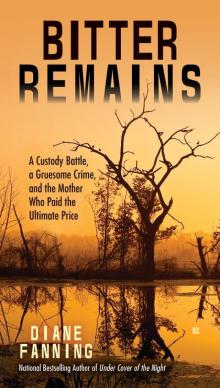 Bitter Remains
Bitter Remains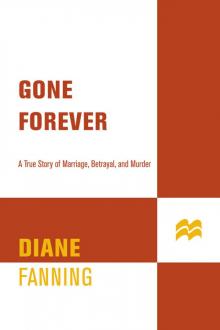 Gone Forever
Gone Forever Sleep My Darlings
Sleep My Darlings A Poisoned Passion
A Poisoned Passion Through the Window: The Terrifying True Story of Cross-Country Killer Tommy Lynn Sells (St. Martin's True Crime Library)
Through the Window: The Terrifying True Story of Cross-Country Killer Tommy Lynn Sells (St. Martin's True Crime Library) Chain Reaction
Chain Reaction Baby Be Mine
Baby Be Mine The Pastor's Wife
The Pastor's Wife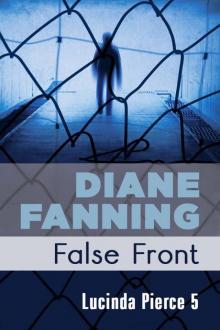 False Front (Lucinda Pierce)
False Front (Lucinda Pierce)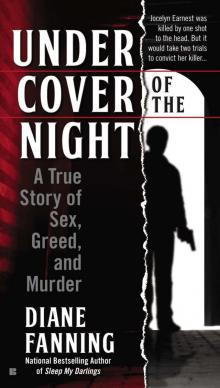 Under Cover of the Night
Under Cover of the Night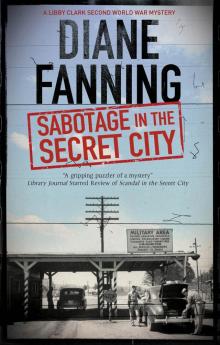 Sabotage in the Secret City
Sabotage in the Secret City Written in Blood
Written in Blood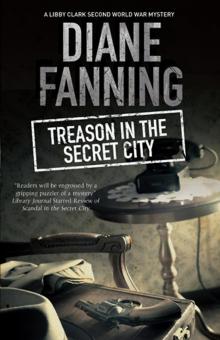 Treason in the Secret City
Treason in the Secret City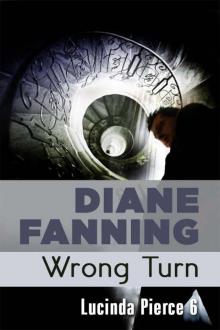 Wrong Turn
Wrong Turn Under the Knife
Under the Knife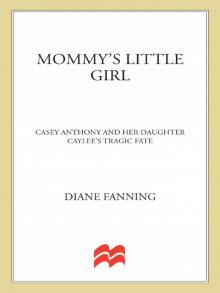 Mommy's Little Girl
Mommy's Little Girl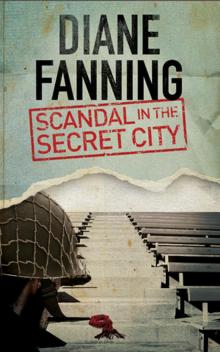 Scandal in the Secret City
Scandal in the Secret City